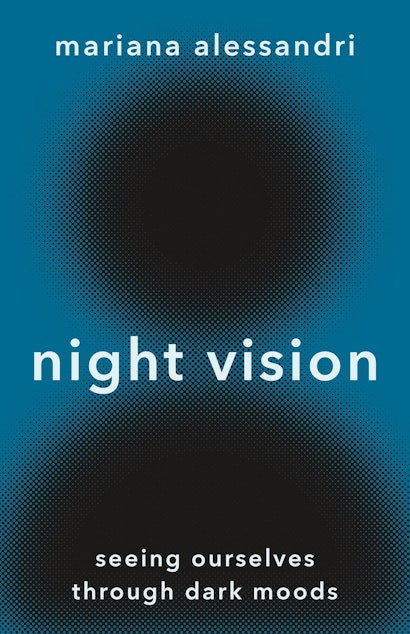You could read Plato’s Apology as Socrates’s attempt to refute charges brought against him, one of which was corrupting the youth. It’s not likely, he argued, that a single man could corrupt a bunch of adolescents while all the rest of society improves them. On the contrary, one individual (or perhaps at most a select few) has the power to better a person (or a horse, in his example) while the masses are more likely to corrupt them. On Socrates’s telling, one bad apple cannot rotten the bunch, but a basketful of rotting apples will certainly spoil a good one.
So, if you want to improve yourself—be happier, for example—you shouldn’t consult society’s ideas of a good life, as portrayed in magazines, pillows, and posters. Instead, you should find the equivalent of a horse trainer. In the case of mental health challenges—anxiety, depression, grief—this usually translates into finding a therapist or psychiatrist, or perhaps even a self-help author. Anyone trained in the art of feeling better would work.
Marc Brackett and Susan David are two of the most popular happiness researchers of 2023, in part because they represent Yale and Harvard, respectively, and in part because they tell us to value all of our emotions, negative ones included. Both scholars write in an accessible style, and both give us permission to feel and even express our negative emotions. They offer us good reasons to revalue negativity, namely, that it’s part of our reality. They encourage us to change our perspective, to become convinced that feeling bad is not shameful. Their message is reassuring, and reading them is a bit like home-therapy. Neither is a practicing therapist, but both aim to help us feel better about feeling bad.
Long before academic and disciplinary boundaries were built, ancient philosophers also tried their hand at being therapists. Zeno of Citium, the founder of Stoicism, sold ataraxia—freedom from worry—in the agora before preaching on the painted porch. Likewise, Seneca’s letters to Lucilius are evidence that at least one philosopher thought philosophy was therapeutic. Today, when I ask my college students which philosopher made the greatest impression on them, they often choose Seneca. His adage “change your attitude, not your surroundings” is a favorite in my Introduction to Philosophy class.
Socrates, Zeno, and Seneca were trainers of humans, not horses, using wisdom as a tool to help people suffer less. So, although most philosophers in the US don’t consider themselves any kind of therapist (and may even object to the self-help type of philosophy becoming popular today), some of us believe that philosophy can help people feel better.
If philosophy has always been therapeutic, it has also always been more than therapeutic. In addition to reading the Apology as a refutation of bogus charges brought against Socrates, you could also read it as a good, old-fashioned, social critique. With 501 jurors, Socrates’ trial amounted to making him an orator—a public man speaking to all of Athens—and he did not squander the opportunity to chastise them:
I was attached to this city by the god—though it seems a ridiculous thing to say—as upon a great and noble horse which was somewhat sluggish because of its size and needed to be stirred up by a kind of gadfly. It is to fulfill some such function that I believe the god has placed me in the city. I never cease to rouse each and every one of you, to persuade and reproach you all day long and everywhere I find myself in your company.
At this point in the dialogue, Socrates had just finished criticizing his fellow Athenians for caring too much about their wealth, reputation, and rank—things he said have little importance—and for caring far too little about what matters most: virtue, wisdom, and “the best possible state of your soul.” Socrates was panning out, far enough to launch a critique against the values of ancient Athens. Few people are willing to take on society at that scale, to see and say something about how the masses are doing it wrong. And Socrates did all of this in the name of philosophy. By leaving us the image of the gadfly, Socrates was giving philosophers permission—or perhaps even a directive—to be social critics.
Karl Marx famously complained that philosophers merely interpreted the world. “The point, however, is to change it.” To change a world, a philosopher would first need to convince people that their current world is causing unnecessary suffering. If this can be accomplished—that’s a big if—then a plan of action would follow. Once a good argument has been made for why the present world is not serving us very well, we could begin to think collectively about how to refashion it. This move, I’ve come to realize, requires a faith in humanity greater than many philosophers have. It requires believing that we can change more than just ourselves.
As a discipline, philosophy can aim higher than helping individuals suffer less. Philosophy can show us why and how so many of us suffer (and in similar ways), and it can help us see that entire worlds, not just individuals, can be improved. Philosophy can be self-help and social critique.
Mariana Alessandri is associate professor of philosophy at the University of Texas Rio Grande Valley, the nation’s first bilingual university. In addition, she and her partner are the founders of RGV PUEDE, a nonprofit whose mission is to promote dual language education in South Texas public schools. They live on the border with their two tesoros. Find out more at marianaalessandri.com.

